[Enjoy today’s guest post by OTI fan and expert on musicals – movie or otherwise – TC Cheever]
Let’s take a moment here to discuss the classic 1971 musical “Willy Wonka and the Chocolate Factory”, based upon Roald Dahl’s book “Charlie and the Chocolate Factory”. It’s a movie that has a reputation as a great movie to watch while stoned – ironic, because it is a film that delivers a strong and clear anti-drug message.
Four of the five children who win the Golden Tickets have distinct personality types and character traits that match a class of controlled substance. The eventual fate of each child is also directly tied to the type of drug they represent and in fact is either illustrative of it, or ironically tied to it. Charlie, with whom we as viewers are meant to identify, does not precisely fit this model though his fate is also tied to a type of controlled substance (more on this later).
Augustus Gloop
The first winner of the Golden Ticket and the first to meet an untimely fate is Augustus Gloop. From the moment we see Augustus, he’s eating… something. He’s pudgy. He’s sluggish. In the movie, he can barely be bothered to stop eating to answer the interviewer’s questions. When he gets to Wonka’s factory, he rushes into the Chocolate Room and immediately kneels down by the chocolate fountain, dipping his hands into the river and drinking the chocolate out of his hands. It’s a seemingly harmless action; people drink from streams all the time without any ill effects.
Consider this: the Chocolate Room is the first we really see of Wonka’s factory. Before entering, he describes it like this: “Inside this room, all my dreams become realities, and some of my realities become dreams.” It’s a giant room that contains a candy-filled garden. The entire room is an exaggerated slice of the real world: a candy-filled garden designed not only to tempt, but to put the temptation in a setting that gives a feeling of reassurance. Augustus drinks from the river, which is a natural part of this environment, and then… he falls in. He engages in a practice that is natural and should be safe, and he goes to his end inside of a giant pipe.
Augustus Gloop represents marijuana.
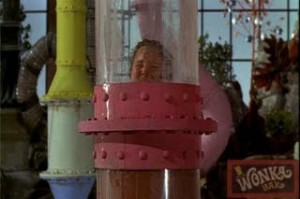
Clear the pipe, then pass the pipe.
Augustus meets his fate prior to the remaining kids taking the boat trip on the Wonkatania. Marijuana bears a reputation of being “the gateway drug”; Augustus’ experience is the gateway to the more sinister experiences to come. His end comes in the river upon which the rest of then children then travel to their own ends, via a ship called the Wonkatania.
The Wonkatania
The boat trip starts off pleasantly and benignly enough, but then quickly goes awry once the boat is inside the tunnel. This is one of the more notorious scenes in the movie because some of the images projected behind the boat during the voyage are disturbing: a snake slithering across a man’s face, and a chicken’s head being cut off with a cleaver. The boat is churning faster and faster, only Wonka knows what’s going on, and he’s not revealing anything. It becomes literally and metaphorically a “bad trip”. The boat rides ends at the doors of Wonka’s “Inventing Room”.
If Augustus represents marijuana and his fate happens in a stylized candy garden, it’s worth noting that the remaining kids meet their fates squarely within a more traditional factory where things are manufactured, not grown.
Violet Beauregard
Violet Beauregard is the second victim of Wonka’s factory tour. When Violet talks, she talks nonstop in a rapid machine-gun delivery. She’s loud and brash like her car salesman father, and she’s the pride of Mile City, Montana. Violet is middle-America. Like Augustus, Violet is orally fixated but unlike Augustus, who constantly consumes and shows the effects of his consumption, Violet appears to consume while in fact not really consuming much of anything at all. She meets her fate when she takes the Three Course Dinner gum (soup, entree and dessert in gum form) and despite Wonka’s protestations begins to chew it.
Upon chewing the gum, Violet describes the amazing meal she’s not really having until she hits dessert. As she experiences the sensation of blueberry pie, she begins to turn shades of blue and violet and begins to swell up like a balloon, all by eating the very item that’s supposed to satiate her appetite.
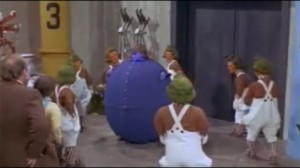
Violet needs her baby blues.
Violet Beauregard represents diet pills (it was 1971, after all), i.e. amphetamines.
Veruca Salt
Veruca Salt is our second Golden Ticket winner and the third child to fall victim to the Wonka factory. To be fair, though, she doesn’t actually find the golden ticket; her father’s employees find if for her among the cases upon cases of Wonka bars that Mr. Salt has brought on to his factory floor. Veruca doesn’t need to find her own ticket. She’s got people for that. Veruca is wealthy, spoiled, and paranoid. Upon being told that she can’t have a golden egg, she throws a temper tantrum (in song; it’s a musical and you always sing at the emotional crest) and Veruca meets her by standing upon on a giant scale.
Veruca Salt represents cocaine.
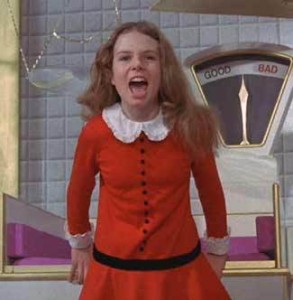
I can't feel my TEETH!
Mike Teevee
From the moment we meet Mike Teevee, he’s immersed in a reality other than the one everyone around him is experiencing. He’s glued to the television, watching westerns (again, 1971 – Gunsmoke was a Top 10 show). He’s barely engaged in the world around him and can’t really be bothered with it. Mike meets his end in a giant laboratory where perceptions of reality are being explored. Wonka is trying to beam actual candy into television sets. Mike positions himself in front of the giant cameras, where he’s broken down into millions of tiny colored pieces that travel through the ether. When he comes back together again, he’s very, very small.
Mike Teevee represents hallucinogens, specifically LSD.
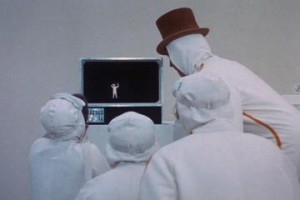
The very tiny doors of perception
Charlie Bucket
Charlie Bucket doesn’t meet a horrible fate – by design. Charlie makes one major transgression in Wonka’s factory, when he samples the Fizzy Lifting Drinks. But it is important to note that this isn’t really Charlie’s idea. It’s Grandpa Joe who suggests doing it: “Let’s take a drink, Charlie. Nobody’s watching. A small one won’t hurt us.” Charlie is initiated into the behavior by the older generation and told that it’ll be okay to have the Fizzy Lifting Drinks. It won’t hurt you.
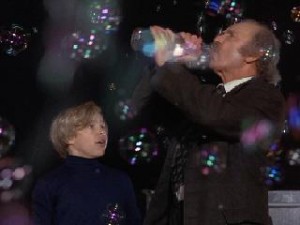
I learned it from watching you, Grandpa!
And while he comes dangerously close to a horrible fate in the exhaust fan, Charlie is able to save himself because he didn’t overdo it. He suffers no obvious effect when this is over: he’s not in danger of being made into fudge like Augustus, he’s not a giant blueberry like Violet, he’s not heading to the incinerator like Veruca and he’s not small like Mike. No, Charlie is just fine. At the end of the film, even though he broke the rules by drinking, he returns the Everlasting Gobstopper to Wonka symbolically rejecting “hard drugs” and because he’s played more or less by society’s rules, he gains it all. He didn’t do anything really wrong, after all; he and Grandpa Joe just shared a drink.
Charlie Bucket is alcohol.
[Like it? Disagree with it? Craving an Everlasting Gobstopper? Sound off in the comments!]
Oversimplyfingit:
Drugs=BAAAAAAAD, Ethanol=GOOD, Got it?.
Drugs=BAAAAAAAAD, Ethanol=GOOD.
SOMEHOW ETHANOL IS NOT A DRUG. And I, Apparently, LACK ONE FUCKING STANDARD!!!!!
Cheers!!!
Brilliant
im on board with your synthesis. but what exactly are you trying to say? is willy wonka an allegorical drug pusher?
and what says you about the fact that charlie wins the chocolate? is alcohol deemed an excusable addiction based on legality?
summation: great article, but i want that conclusion! wheres the finality?
Genius. Took me a minute to get the importance of the scale.
It’s scary how true this dynamic works out. This movie really made the most of psychological profiles, and the feeling you sometimes get when you look at a kid and you just know theyre gonna grow up to be a whatever kind of addict. I guess that’s why it’s so enduring. Also it connects with why everyone feels the most remorse for Augustus. And then by the time Veruca comes around no one really blinks. They feel like Augustus doesn’t deserve his fate, but Veruca had it coming.
But I wonder what Wonka symbolizes? But what does Charlie really win? I suppose just he wins at life. Or he wins a “great future” by not succumbing to hard drugs, but I wonder if there’s anything more. Especially with his crazy random ticket process.
Wow, someone must have too much time to think about movies. I don’t believe for one second Roald Dahl had this in mind. The song lyrics make it pretty clear what the kids sins are. Augustus is a glutton, Veruca is greedy, etc. etc. Why read more into it when Dahl is already beating us over the head with it?
Willy Wonka sucks. Both films. And the book they’re based on.
What about the addictions they already face? Food, television, material possessions? Forget about pot and LSD, these seem to be the addictions the movie is trying to steer us away from.
You guys crack me up
Pretty damn funny article! However, I reject the 70’s version of the story. Only Roald Dahl’s original classic and Tim Burton’s pitch-perfect adaptation (which actually got the name right!) count in my book. As such, that sort of screws up the whole Charlie-being-alcohol thing, because that never happened in the book or in the REAL movie version. In that case, he’d simply be the abstainer.
Yea sorry, but it seems you didn’t have many ideas for writing an article. As the site says, you’re overthinking it. Roald Dahl wasn’t commenting on drugs, and why would he? His message as it stands is much stronger and relates to us all. It’s obvious that he’s showing different personality types and the problems that stem from them, as passed down through the years from parent to child. Why would he spend a whole story commenting on drugs when they are only issue, and we all already know the outcomes from heavy abusers. The story as it stands suits me just fine.
Ya know sometimes a cigar is just a cigar.
WAAAAY to much time on your hands, but a fun read. Silly but fun.
I guess the writer can be forgiven for over-thinking it but this article is pure stoner fantasy. None of the author’s points even ring slightly true. Chocolate pipe equals marijuana pipe — get it? Get it?!
Nope.
As usual there are one or two idiots who don’t get that this site is about reading things into things which aren’t there. But this is usual since modern society is based around morons who have no imagination and think a newspaper is a wall of text.
Charlie becomes the Drug overlord because he has the self control to manage the supply without letting his use get the better of him. Grandpa no doubt will become a faithful lieutenant, handling intelligence and deciding if any Oompa Loompas need to be whacked for using too much product.
Charlie will increase efficiency and reduce the temptation to steal by making the Oompa Loompas work naked and gagged so they can’t sing. Violet and Veruca will be put to work on the game, their addictions being a way to control them so they increase revenue. Mike TeeVee and Augustus Gloop will be enforcers, not too bright but good muscle in a fight and loyal to the person who supplies them with their fix.
I’m with whenclamsattack (awesome name, btw)- Good analysis, but, erm, what’s the thesis? Oh, and Wonka is the drug dealer himself, of course. Maybe pop culture is wrong, but I often see dealers that are, in fact, not addicted to whatever they distribute in movies, so I’m guessing Wonka’s capitalist persona and avoidance of consumption (mostly- IIRC, he only sips from and bites the sugar cup, and in more of a symbolic/demonstrative than addictive gesture) is Wonka As Drug Lord.
“Also it connects with why everyone feels the most remorse for Augustus. And then by the time Veruca comes around no one really blinks. They feel like Augustus doesn’t deserve his fate, but Veruca had it coming.” -Nark
Really? It seems more like we’re supposed to think *all* of the kids are snotty, spoiled little prats that get what’s coming to them. Sure, there is shock value to Augustus’s fate because he’s the first, but no greater amount of sympathy or soft feelings for him than the other kids.
Windywoo: Win, on all aspects.
and to think that all I got out of the movie, even as a kid, was that all but Charlie were spoiled kids whose parents gave them no boundaries, or discipline. Never really thought about the drug angle, so I too, will say that you have WAY TOO MUCH time on your hands!
This entire article is ridiculous. To me this is what is wrong with e-journalism and goes to show how much most of the world lacks integrity. Joke or not this to me represents what is wrong with the world.
Nice article. I follow your interpretation on all of the characters except for Veruca Salt. Maybe I’m too naive to know the ins and outs of hard drugs, but I don’t see how any of her qualities directly relate to cocaine the way the other characters’ relate to their substances.
Also, ignore all of the “too much time on your hands” comments. This is some interesting (albeit perhaps a little far-fetched, but that’s where the fun of it is) stuff.
Again, nice job.
*giggle* Wow.
No matter how you describe this movie…Ima still think of is as a creepy movie that was made awesome when Tim remade it.
I thought both movies bordered on being somewhat to more-than-a-little
disturbing, yes.
The overthinking thing is a good idea, I hope the idea filters along the internet’s meme corridor to the world of physics; but there are too many university tenures on the line.
Not to mention egos….
F*** this movie, and f*** Tim Burton’s even worse attempt. And for that matter, f*** this article. The book’s about gluttony and sloth and addiction and greed AS THEY PERTAIN TO CHILDREN. For such a famous and accessible book, there are sure a lot of people who can’t understand it.
This movie is (to me anyways) right up there with “Dumbo”‘s ‘Pink Elephants’ and “The Many Adventures of Winnie the Pooh”‘s ‘Heffalumps and Woozles’ that were scary fun @ young ages but go on to have a possible perception of brilliant depth.
I have seen the perceived evils of marijuana(sp?), cocaine and even heroin through people who have popped in and out of my life (my mom was a county corrections officer for 30+ years and we meet people who “knew” her just about everywhere.)
Overthinking or not (even if this article is, its not by much)
there is a clear validity to the possibilities in the screenwriter’s and director’s minds.
So much arrogance, so little open-mindedness. That’s one of the TRUE problems of the world today. Unless any one of you can give me an actual reference of Mel Stuart saying what underlying theme(s) there are or are not to the movie [given that film directors, being artists, do sometimes add things to their adaptations that may not have been in the original work, so I’m taking the liberty of ignoring what may have been in Dahl’s mind], you really have no idea what you’re talking about and are saying the theme under question here is nonexistant merely because you do not want it to be there. Sorry for the run-on sentence. And even if Stuart had no such intention, the beauty of art is that each piece’s true meaning is the sum of all the individual opinions formed by each and every one of its appreciators.
Also, as someone who has, shall we say, “experimented” with all the aforementioned substances, I can see the connections being made and find it quite an entertaining thought, to say the least.
So does that make Willy Wonka the drug pusher looking to hire a protege to take his place, but wants someone who won’t get caught up, himself, into sampling the merchandise?
If you(the author) are implying that Roald Dahl intended Agustus to represent marijuana rather then a gluttonness conscious free candy lover id have to strongly disagree. i think he meant all the characters to re[resent what is already plain to see about each character. There is no way Charlie Bucket represents alcohol, that just doesnt make sense.
Gab, yeah maybe you’re right the characters don’t overtly sympathize with Augustus more than Veruca, but I think Charlie does, and like the article says the audience is definitely put in a position to. He was just a fat kid who wanted to eat and was given candy, was it really so wrong? Veruca went that extra mile, and her vice was deemed much more egregious. After all, she might or might not have been incinerated, which is a lot worse than having to be juiced or whatever.
And some of you are taking your hatred a little too far. The writer never said that this was the intention of Dahl or even the writers of the film. He just said the matches are there, and if you think about it it makes sense. Many movies that endure, especially children’s stories, have many correlations to things we intuitively know or see in society, hence why they endure. The pothead, the LSD kid, the coke fiend and the blue collar drinker are all archetypes that are perceived certain ways and are perceived to come to certain ends and theyre all represented here pretty well. It’s interesting.
Just to clarify Augustus/Veruca, lets put it this way. Augustus’ gluttony could have been HORRIBLE and DISGUSTING in the movie, and he could have been just as nasty about it as Veruca, actually all the kids could have been nastier, but they chose to let some of the vices be worse than others, and everyone acts kind of accordingly. Augustus’ gluttony as judged as not so bad, which is insightful and true to life.
Genius! Next, let’s do one of these on The Wizard of Oz! WTF with the flyin’ monkeys?!? Let’s overthink that!!
Really, who are all these morons coming to a site called overthinkingit.com and telling him he’s reading things into it that aren’t there? Who lacks even the tiniest bit of intelligence and humour to see that the entire point of this site is to produce ridiculous analysis?
im closing the book on this one. the article has earned itself 1 dig and the honor of truly stirring up some comment-forum controversy.
guest contributor, i think you have made your point clear. the article states exactly what it needs to state, and there is no more or less than what’s here. if someone has a better, more complete analysis i challenge them to post it.
in summation: why overthink? why not. for the hyper-critical reactions to the article and film i quote the following:
ITS ALL THERE BLACK AND WHITE CLEAR AS CHRYSTAL. YOU GET NOTHING! YOU LOSE! GOOD DAY SIR!
I SAID GOOD DAY